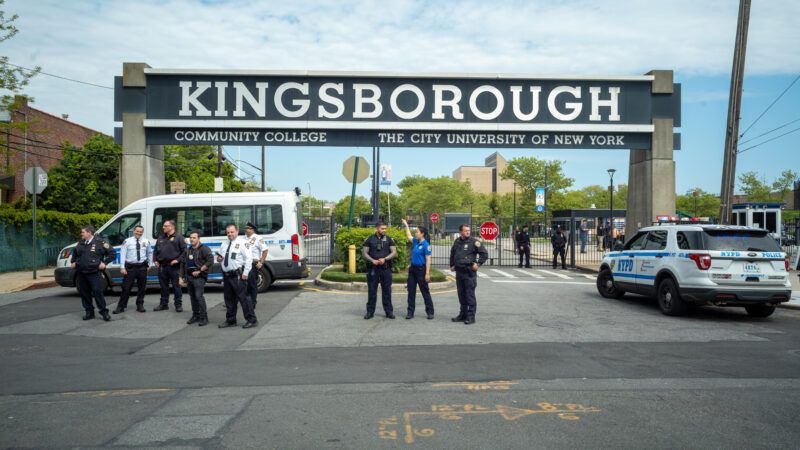New York Community College Abruptly Cancels Jewish Student Event
This isn't the first time a student event has been canceled over alleged safety issues.

Events celebrating Israeli Memorial Day and Israeli Independence Day at two New York City colleges were canceled last month after school officials cited security concerns over planned protests, according to a legal letter sent last week by the Foundation for Individual Rights and Expression (FIRE), a First Amendment nonprofit, to the City University of New York (CUNY).
In May, Baruch College's chapter of Hillel, a Jewish campus organization, had planned to hold an Israeli Memorial Day and Independence Day event in the Hillel building's second-floor lobby. But when other students planned to protest the event, the Baruch College administration suggested alternate locations for the event, instead of offering additional security. Rather than change locations, the students decided to cancel the event.
At Kingsborough Community College (KCC), school officials went so far as to unilaterally cancel a similar event slated for May 13. The event, organized by the KCC Hillel chapter, was supposed to feature a virtual talk from a former Israeli soldier and cybersecurity expert, as well as a memorial service. When other students planned to protest the event, Hillel asked for additional security. But instead of providing it, school administrators abruptly canceled the event just hours before it was set to begin. According to FIRE's letter, KCC's president later claimed that, because the speaker was not slated to attend in person, the cancellation wasn't a "repression of freedom of speech."
"Public institutions, including CUNY campuses, may not stand idly by and allow one group of students to strip another of their First Amendment right to host an expressive event, including by using the threat of disruption to do so," FIRE Senior Program Officer Zach Greenberg wrote in the letter to CUNY, under whose authority both Baruch College and KCC fall. "If CUNY continues to allow hecklers' vetoes, it will not be long before the only speakers able to speak on its campuses will be those whose ideas are sufficiently uncontroversial in the eyes of would-be hecklers of all political stripes."
This is far from the first time that university events have been canceled in recent months over security concerns related to protests over the Israel-Hamas war. In March, Indiana University officials asked another Hillel branch to postpone an event following "concerns for the safety of speakers and attendees." In October of last year, University of Vermont officials cited safety concerns when canceling a lecture from a Palestinian writer. Several colleges, including the University of Southern California and Columbia, canceled their main commencement ceremonies, citing security risks after large anti-Israel protests.
"Students must know that CUNY will protect their right to hold expressive events, without fear of them being canceled or moved due to other students' protected expression," Greenberg wrote. "If others would like to protest—so long as it is not disruptive—administrators must also allow them to move forward."


Show Comments (32)